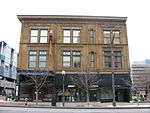William Green Building
Buildings in downtown Columbus, OhioColumbus, Ohio building and structure stubsNBBJ buildingsOffice buildings completed in 1990Skyscraper office buildings in Columbus, Ohio

The William Green Building is a 530-foot (160 m), 33-floor skyscraper in Columbus, Ohio, United States. It was constructed from 1987 to 1990, and was topped out on June 8, 1988. It is the third-tallest building in Columbus, the tallest constructed in 1990s and the eighth-tallest building in Ohio. The low-rise wing that extends to North High Street is constructed on the former site of the Chittenden Hotel. The offices of the Ohio Bureau of Workers' Compensation are located here.
Excerpt from the Wikipedia article William Green Building (License: CC BY-SA 3.0, Authors, Images).William Green Building
West Spring Street, Columbus
Geographical coordinates (GPS) Address External links Nearby Places Show on map
Geographical coordinates (GPS)
| Latitude | Longitude |
|---|---|
| N 39.9663889 ° | E -83.0027778 ° |
Address
William Green Building
West Spring Street 30
43215 Columbus
Ohio, United States
Open on Google Maps









